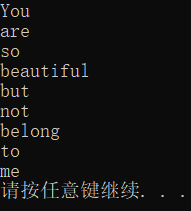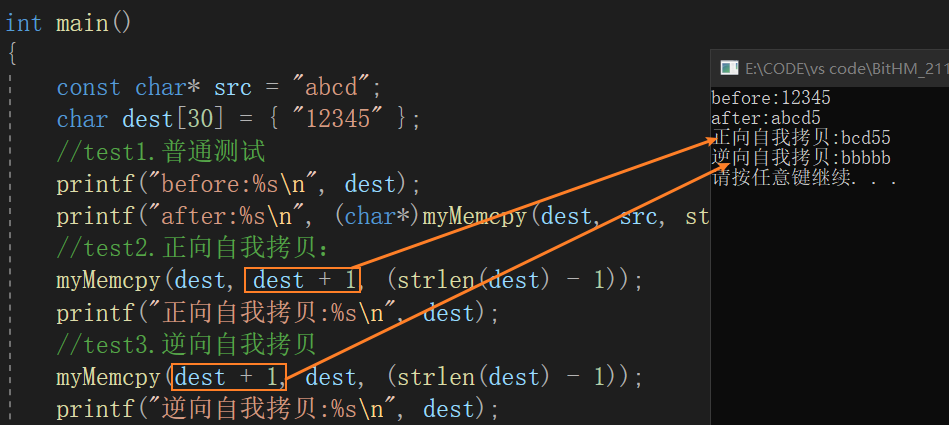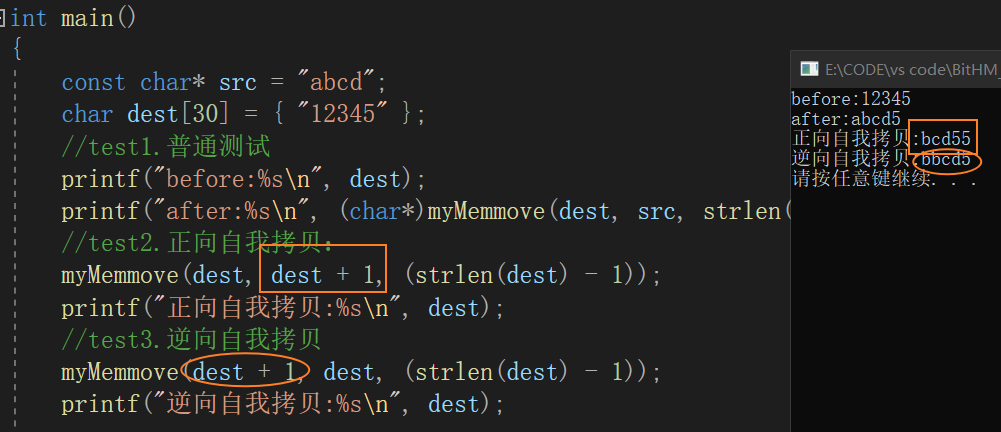String function (the following header files are "string.h")
1.strlen (find string length)
prototype

- String counting does not need to modify the string, so it is decorated with conut;
Simulation Implementation
#include<stdio.h>
#include<Windows.h>
#include<assert.h>
#pragma warning(disable:4996)
//Method 1: counter method -- you need to set a variable separately
size_t myStrlen1(const char *arr) //The string does not need to be modified, so it is decorated with conut
//size_t refers to unsigned int in vs2013
{
assert(arr); //The assert function is used to determine whether the string is not empty
int count = 0;
while (*arr)
{
count++;
arr++;
}
return count;
}
//Method 2: recursion -- do not create temporary variables
size_t myStrlen2(const char *arr)
{
assert(arr);
if (*arr == '\0')
{
return 0;
}
else
{
return 1 + myStrlen2(arr + 1);
}
}
//Method 3: pointer method -- use tail pointer head pointer to obtain the length
size_t myStrlen3(const char *arr)
{
assert(arr);
char *p = arr;
while (*p != '\0')
{
p++;
}
return p - arr;
}
int main()
{
const char *arr = "abcd1234";
int len1 = myStrlen1(arr);
printf("Method 1 string arr Length:%d\n", len1);
int len2 = myStrlen2(arr);
printf("Method 2 string arr Length:%d\n", len1);
int len3 = myStrlen3(arr);
printf("Method 3 string arr Length:%d\n", len1);
system("pause");
return 0;
}
2.strcpy (string copy)
prototype

- Copy the following parameters to the previous parameters without modifying the latter, so the latter parameters are modified with const;
- Note that the size of the following string parameters cannot be greater than the former, otherwise an error will be reported;
- The return value of the function is char * type, which is to support the chain call of the class library function;
Simulation Implementation
#include<stdio.h>
#include<Windows.h>
#include<assert.h>
#pragma warning(disable:4996)
//Programming habit - variable name: ret - > result; SRC - > source (source data); Destination - > destination
char *myStrcpy(char *dest, const char *src)
{
assert(src); assert Function to determine whether the string is not empty
assert(dest);
char * ret = dest;
while ((*dest++ = *src++));
return ret;
}
int main()
{
const char *src = "abcd";
char dest[30] = { "12345" };
printf("before:%s\n",dest);
printf("after:%s\n", myStrcpy(dest, src));
system("pause");
return 0;
}
3.strcat (string splicing)
prototype

- Splice the following parameters to the previous parameters without modifying the latter, so the latter parameters are modified with const;
- In the former, the string space must be large enough to accommodate the spliced string;
- Note that self splicing is not allowed (in this way, the original string will continue to increase during splicing);
- The return value of the function is char * type, which is to support the chain call of the class library function;
Simulation Implementation
#include<stdio.h>
#include<Windows.h>
#include<assert.h>
#pragma warning(disable:4996)
char *myStrcpy(char *dest, const char *src)
{
assert(src);
assert(dest);
char * ret = dest;
while (*dest) //Point the pointer to the end of the dest string
{
dest++;
}
while ((*dest++ = *src++)); //Splice the latter string from the tail
return ret;
}
int main()
{
const char *src = "abcd";
char dest[30] = { "12345" };
printf("before:%s\n", dest);
printf("after:%s\n", myStrcpy(dest, src));
system("pause");
return 0;
}
4.strcmp (string comparison)
prototype

- Compare the size of the two strings without modifying the string, so the two parameters are modified with const;
- String comparison is judged by the ASSIC code value of the first different character of two strings;
- If STR1 > STR2, return 1; If str1=str2, return 0; If STR1 < STR2, - 1 is returned;
Simulation Implementation
#include<stdio.h>
#include<Windows.h>
#include<assert.h>
#pragma warning(disable:4996)
int myStrcmp(const char *str1, const char *str2)
{
int ret = 0;
assert(str1);
assert(str2);
//The two string pointers are subtracted. If they are the same, look at the next character until there are characters of different sizes or '\ 0'.
while (!(ret = *(unsigned char *)str1 - *(unsigned char *)str2) && *str2)
{
++str1, ++str2;
}
if (ret < 0)
{
ret = -1;
}
else if (ret>0)
{
ret = 1;
}
return (ret);
}
int main()
{
const char *str1 = "abcd4";
const char *str2 = "abcd5";
int comp = myStrcmp(str1, str2);
if (comp > 0)
{
printf("str1>str2\n");
}
else if (comp < 0)
{
printf("str1<str2\n");
}
else
{
printf("str1=str2\n");
}
system("pause");
return 0;
}
5.strncpy (length limited string copy)
prototype

- "Secure copy" function, that is, compared with strcpy function, the parameter increases the length parameter of the string that needs to be copied;
- '\ 0' will not be brought after copying, and you need to add it yourself;
6.strncat (length limited string splicing)
prototype

- Compared with strcat function, the parameter of "safe splicing" function increases the length parameter of the string that needs to be spliced;
- '\ 0' will be added to the spliced string by default;
7.strncmp (length limited string comparison)
prototype

- The "security comparison" function compares the first num characters of two strings;
- The operation rules are the same as strcmp;
8. Str (string substring lookup)
prototype

- This function can return the first character address of str2 function for the first time in str1;
application
- Replace a string of a string
- Through the while loop to find the location of a string in a string, that is, the number of times;
(the following are two application examples of strtr)
//strstr example_1 replacement
//Replace a small string with a long string
int main()
{
char str[] = "This is a simple string.";
char *pch;
pch = strstr(str, "simple");
strncpy(pch, "sample", 6);
puts(str);
system("pause");
return 0;
}

//strstr example_2 find
//Find the specific location of the small string from a long string
int main()
{
const char *s1 = "abcd1234worldABCD-1world,nkworld.";
const char *s2 = "world";
const char *s = s1;
int count = 0;
char *sub_str = NULL;
while (1)
{
sub_str = strstr(s, s2);
if (sub_str == NULL)
{
break;
}
count++;
//sub_str = strcpy(sub_str, s2);
printf("The first%d individual%s Location of:%d\n", count, s2, sub_str - s1);
s = sub_str + 1;
}
system("pause");
return 0;
}

Simulation Implementation
char *myStrstr(const char*str1, const char *str2)
{
assert(str1);
assert(str2);
char* str_p = (char*)str1;
char* str_q = (char*)str2;
char* judge_p = str_p; //External circulation aiming point
if (*str2 == '\0')
{
return NULL;
}
while (*judge_p!='\0')
{
const char* move_p = judge_p ; //Internal loop str1 compare pointer
char* judge_q = str_q; //Internal loop str2 compare pointer
while (*move_p && *judge_q && *move_p == *judge_q)
{
move_p++;
judge_q++;
}
if (*judge_q == '\0')
{
return judge_p;
}
judge_p++;
}
return NULL;
}
int main()
{
const char *s1 = "abcd1234world5678";
const char *s2 = "world";
char *s = myStrstr(s1, s2);
printf("before:%s\n", s1);
printf("after:%s\n", s);
system("pause");
return 0;
}

9.strtok (string segmentation)
prototype

- Split string function: traverse the string pointed to by parameter 1, and return the first pointer of the corresponding string after encountering the split character contained in parameter 2;
- The second parameter can store multiple split characters, such as: ",." (all characters in double quotation marks, including spaces);
- Only one split string can be returned at a time because there is only one return value;
- That is, if you want to use the function for a string multiple times, you can only set parameter 1 to NULL for the next parameter transfer after the first use, otherwise the record will be cleared and the starting position of the string will be traversed again;
- There is a static variable inside the strtok library function to save the original string address as a static global variable. When one is divided, it will automatically move to the address after the first separator;
- The essence of split string is to convert the corresponding separator character of the original string to '\ 0';
- [note] according to the previous regulation, the library function will modify parameter 1, so the string pointed to by parameter 1 cannot be defined in the character constant area;
application
- Dividing a long string into multiple small strings by multiple references to the function;
- Note: as can be seen from the above features 4 and 5, when calling the function repeatedly to split multiple substrings, the first parameter does not change;
//strtok example_1
//Splits a long string into smaller strings
int main()
{
char s1[] = "You are so beautiful,but not belong to me.";
char *s = strtok(s1, ", .");
while (s != NULL)
{
printf("%s\n", s);
s = strtok(NULL, ", .");
}
system("pause");
return 0;
}

10.strerror (error report)
prototype

- Return error information through error code;
- Understanding of error code: 0 in Eg:return 0; is an "error code" returned by the main function. Generally, 0 represents success;
- The existence of error codes is convenient for computers and error messages are convenient for programmers; computers are good at dealing with numbers but not strings, which is opposite to people;
- The C language system global variable errno will automatically set the error code of the corresponding error message when an error occurs when using the C library function;
application
#include<stdio.h>
#include<Windows.h>
#include<string.h>
#include<errno.h>
#pragma warning(disable:4996)
//strerror example
//Understand the error information and error code by opening the error file
//The header file < errno. H > must be added when using the system global variable errno
int main()
{
printf("before errno:%d\n", errno); //Output errno original content
FILE * pf = NULL;
pf = fopen("test.text", "r");
if (pf == NULL)
{
printf("after errno:%d\n", errno); //Output the content automatically modified by errno after encountering an error
printf("ERROR Opening file test.text:%s\n", strerror(errno));
}
system("pause");
return 0;
}

Character classification function
Character classification function (return true if its parameters meet the following conditions) header file: < ctype. H >
iscntrl: any control character
isspace: white space characters: space ',' page feed '\ f', line feed '\ n', carriage return '\ r', tab '\ t' or vertical tab '\ v'
isdigit: decimal digits 0 ~ 9
isxdigit: hexadecimal digit, including all decimal digits, lowercase AF and uppercase AF
islower: lowercase letter a~z
isupper: capital letters A~Z
isalpha: letter AZ or AZ
isalnum: letters or numbers, az,AZ,0~9
ispunct: punctuation mark, any graphic character not belonging to numbers or letters (printable)
isgraph: any graphic character
isprint: any printable character, including graphic characters and white space characters
Memory operation function (the following header files are "string.h")
- The basic unit of operation of mem series library functions is bytes
- The parameter type of void * indicates that the operation can be performed on any type
1.memcpy (memory copy by byte)
prototype

- Self copying is not allowed, which is the difference from memmove; (but the current editor supports it, which means that there is no difference between the two functions)
Analog implementation + special applications
#include<stdio.h>
#include<Windows.h>
#include<string.h>
#include<assert.h>
#pragma warning(disable:4996)
//Simulation Implementation of memcpy
//test2 and test3 are special applications
void* myMemcpy(void* dest, const void* src, size_t len)
{
void* ret = dest;
assert(dest);
assert(src);
while (len--)
{
*(char*)dest = *(char*)src;
dest = (char*)dest + 1;
src = (char*)src + 1;
}
return ret;
}
int main()
{
const char* src = "abcd";
char dest[30] = { "12345" };
//test1. General test
printf("before:%s\n", dest);
printf("after:%s\n", (char*)myMemcpy(dest, src, strlen(src)));
//test2. Forward self copy:
myMemcpy(dest, dest + 1, (strlen(dest) - 1));
printf("Forward self copy:%s\n", dest);
//test3. Reverse self copying
myMemcpy(dest + 1, dest, (strlen(dest) - 1));
printf("Reverse self copy:%s\n", dest);
system("pause");
return 0;
}

- The error of reverse copy reflects that it cannot copy itself
- Specific reason: memory overlap occurs. This function copies the copied data to the next as new data while copying;
2.memmove (two overlapping memories can be copied by byte)
prototype

Analog implementation + special applications
#include<stdio.h>
#include<Windows.h>
#include<string.h>
#include<assert.h>
#pragma warning(disable:4996)
//Simulation Implementation of memmove
//test2 and test3 are special applications
void* myMemmove(void* dest, const void* src, size_t len)
{
void* ret = dest;
assert(dest);
assert(src);
char* p = (char*)dest;
char* q = (char*)src;
if (p > q && p < q + len) //Reverse self assignment, special treatment
{
//Assignment from the tail can be from right to left
p += (len-1);
q += (len-1);
while (len--)
{
*p = *q;
p--;
q--;
}
}
else
{
//From left to right
while (len--)
{
*p = *q;
p++;
q++;
}
}
return ret;
}
int main()
{
const char* src = "abcd";
char dest[30] = { "12345" };
//test1. General test
printf("before:%s\n", dest);
printf("after:%s\n", (char*)myMemmove(dest, src, strlen(src)));
//test2. Forward self copy:
myMemmove(dest, dest + 1, (strlen(dest) - 1));
printf("Forward self copy:%s\n", dest);
//test3. Reverse self copying
myMemmove(dest + 1, dest, (strlen(dest) - 1));
printf("Reverse self copy:%s\n", dest);
system("pause");
return 0;
}

- There is no error in reverse copy, which is different from memcpy function;
- For library functions, the method is more complex and perfect. Now there is no difference between the two functions;
3.memset (memory assignment by byte)
prototype

- Function: initialize the address pointed by ptr byte by byte and num bytes to value;
- size_t is the abbreviation of unsigned integer type;
application
#include<stdio.h>
#include<Windows.h>
#include<string.h>
#pragma warning(disable:4996)
//memset can make the initialization of an array not cyclic
int main()
{
int a[5];
memset(a, 0, sizeof(a)); //Note not sizeof(a) / sizeof(a[0])
int b[5];
memset(b, 1, sizeof(b)); //Initialization by byte, so the assignment of 1 will not meet the expectation
for (int i = 0; i < 5; i++)
{
printf("%d ", a[i]);
}
printf("\n");
for (int j = 0; j < 5; j++)
{
printf("%d ", b[j]);
}
printf("\n");
system("pause");
return 0;
}

4.memcmp (compare memory content size)
prototype

- The comparison shall be processed in strict accordance with ASCII code, including digital type;
- Any ASCII character can be compared, while strcmp can only compare characters;
- If PTR1 > ptr2, return 1; If ptr1=ptr2, return 0; If PTR1 < ptr2, return - 1;